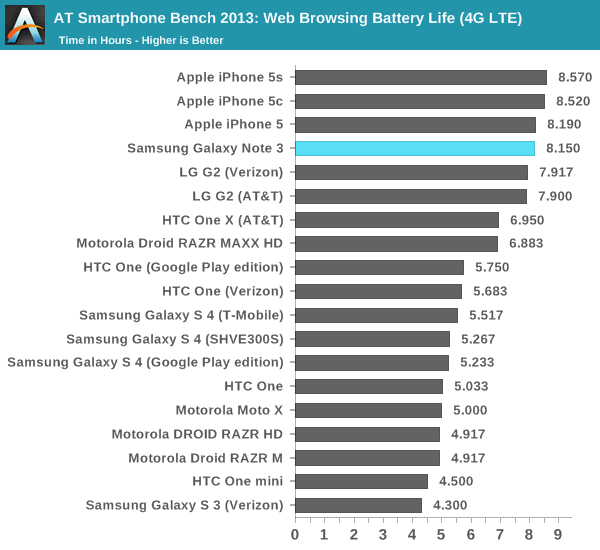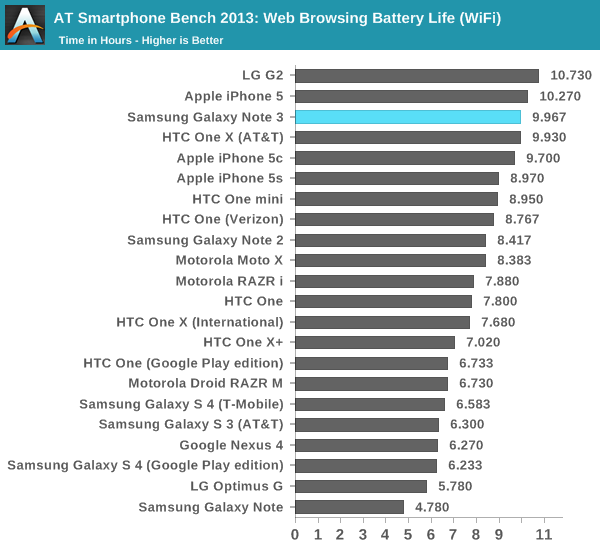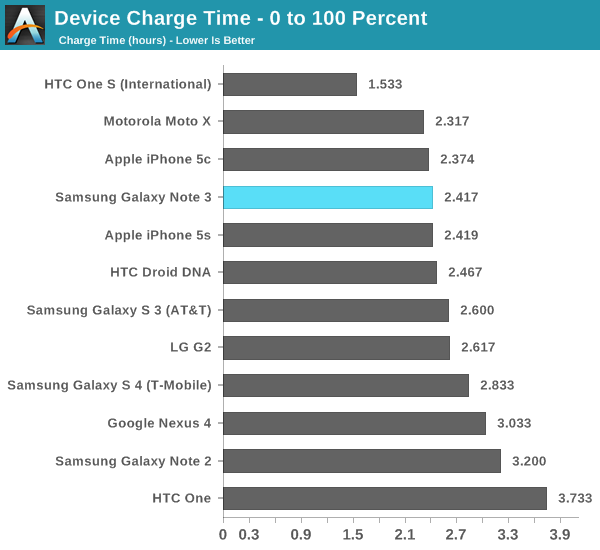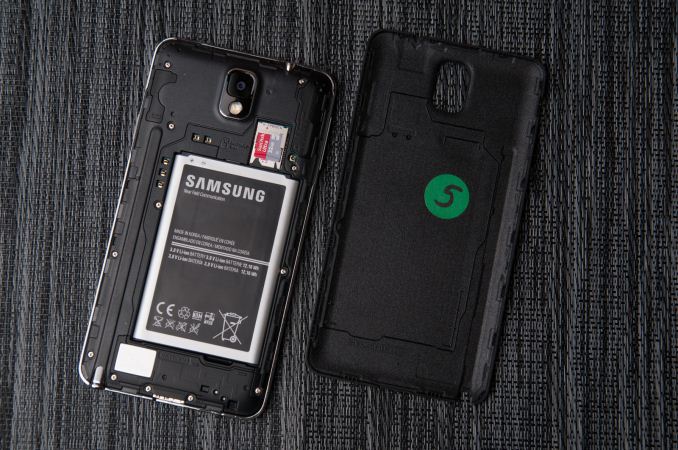Samsung Galaxy Note 3 Review
by Brian Klug on October 1, 2013 9:00 AM EST- Posted in
- Smartphones
- Samsung
- Mobile
- Android 4.3
- galaxy note 3
Battery Life
Battery life remains probably the single largest differentiator for devices lately, and of huge concern to enthusiasts and normal shoppers alike. We’ve already caught a glimpse of how well 8974 fares from a power perspective inside the LG G2, a device that posted some seriously impressive battery numbers. The Note 3 we’re looking at is also 8974 based since it’s a T-Mobile model, and thus we expect the same kind of battery life.
With this generation of Note, battery gets even larger. The Note started with a then quite large 9.25 watt hour battery, then Note 2 moved to 11.78 watt hours, and Note 3 now moves to a very large 12.16 watt hour battery with of course the newest 3.8V chemistry and all that comes along with it. Display size goes up, but those power gains are offset in other places.
After we talked about the panel self refresh features in the G2 a few people reached out and let me know that this feature has been shipping for a while in some phones, and it’s easy to check for. If we look under the display subsystem we can see that the same MIPI_CMD_PANEL type 9 is used, which refers to this type of interface.
Qualcomm HWC state: MDPVersion=500 DisplayPanel=9
define MIPI_CMD_PANEL ‘9’
Our battery life tests are unchanged and consist of a set of popular webpages that are loaded on a schedule with the display set to exactly 200 nits and repeated until the battery runs out and the device dies on both WiFi and cellular data connections. In this case that means T-Mobile LTE which is 10 MHz FDD in my market, I haven’t had a chance to run the Note 3 on HSPA+ yet, or complete the call test (which is starting to get ridiculous, and probably breaks 24 hours in the case of the Note 3).

On LTE the Note 3 does very well, coming just shy of the pack of iPhones, at just over 8 hours. Interestingly enough it’s just north of the G2s as well, which do have a smaller battery but also smaller display. The Note 3 also is the first device to ship with Qualcomm’s QFE1100 envelope tracker solution from the RF360 front end portfolio, which lowers power consumption by up to 20 percent and heat dissipation by up to 30 percent by allowing the power amplifiers to follow the desired output waveform. There’s more on that later in the cellular section.

On WiFi the Note 3 does better by 22 percent, but not the kind of huge jump I’m used to seeing between cellular and WiFi testing. This tells me the Note 3 battery life is really gated by the display, which is almost always the largest consumer of power in a device. That said the Note 3 does very well all things considered, especially in comparison to the APQ8064 (Fusion 3) phones which came before it, like SGS4. New silicon and new process inside MSM8974 definitely helps move battery life forward here with the race to sleep game.
Charging is an interesting story on the Note 3, but primarily because of what doesn’t change. The Note 3 continues to use Samsung’s tablet charging specification and charger, which has 2 amps of maximum output. The Note 3 draws 2 amps over a considerable amount of the charging curve, like other Samsung devices (in the linear part of the charge curve). USB 3.0 doesn’t change things up here quite yet with the new supported charge voltages that are coming eventually with the power delivery specification.

The Note 3 does charge faster overall compared to the SGS4 however thanks in part to the new PMIC (PM8941) which is part of the overall 8974 platform story.











302 Comments
View All Comments
barry spock - Tuesday, October 1, 2013 - link
I don't usually bother to comment here but I agree with the above comment. It doesn't matter if it's samsung or android that's playing funny buggers. The fact that the benchmarks are being tampered with it should be clearly stated in every review involved.Spunjji - Tuesday, October 8, 2013 - link
It was. Several times. Your comment is *utterly* pointless.bigpics - Wednesday, October 2, 2013 - link
Actually thanks to Anand Lal Shimpi and Brian Klug on this site we do know that it's almost everyone in Android world who matters at least (the article mentions LG, Asus and HTC): http://appleinsider.com/articles/13/10/02/asus-htc...As for others, the AppleInsider article quotes Andandtech as saying, "With the exception of Apple and Motorola literally every single OEM we’ve worked with ships (or has shipped) at least one device" that similarly fudges benchmarks."
That being said, I think it should be CLEARLY pointed out in every review of every such device if unfudgeable benchmarks can't be easily created (or until they are).
ESC2000 - Sunday, October 6, 2013 - link
In addition to running the benchmarks, Brian also commented extensively on his real world experience using the phone. So instead of getting your panties in a twist about unscrupulous approaches to benchmarks, why don't you focus on the real world performance that is much more informative and not affected by the benchmark issues? I'm betting that most of the panty-twisted people don't even use Samsung products but just feel the need to take them down a notch.Geronemo3 - Thursday, October 24, 2013 - link
He called it cheating more than a few times. Yes manufactures should stop this stupidity. Plus the benchmarks are for reference and we can maybe minus 10% performance from it. I don't remember the last time I purchased a smartphone just on benchmarks alone.Aenean144 - Tuesday, October 1, 2013 - link
Anand,As soon as you published the benchmark charts with the Note 3 sitting at the top, as the highest performant Android device, you've willingly assisted in Samsung's aims with their benchmark boosting processes. This is their goal. Even though you mention it in words, it's the charts that are important as the charts are linked and displayed far and wide across the Internet. The words will be quickly forgotten or are just unread as is typical in the attention deficit addled Internet.
It's unfair to the LG G2, the Sony Z1, likely to the Nexus 5, and to any other Snapdragon S800 device out there that don't employ the same tactics. There's no magic to Samsung's use of the S800 here. It should perform about the same as any other S800 device.
But by publishing the charts as you did in this review, you are being nothing but a sop to Samsung. Call it what it is. Cheating. Don't publish the benchmark comparison charts if you *know* that Samsung is cheating. Don't publish the charts if you know that others are cheating. Your customers are your readers, not Samsung, not LG, not Qualcomm, not Apple or whoever.
uvaman20 - Tuesday, October 1, 2013 - link
Aenean144 and others,I don't care about Samsung and their cheating and if Anandtech didnt bring the story YOU and prolly 98% of the people on the Earth wouldn't know about this so stop blaming them. Blame Engadet, Phonearena, GSMarena and others for that...They presented the idea and they published that (even they knew that Samsung will be pissed). We know they are "cheating" now and LIVE WITH THAT. Its the same shit with with car manufactures and consumption? Ask them why they cheating and go that long that you dont want to buy cheating car and I can bet you did... Look at browser games, they are all cheating and? Government is cheating us on a daily base and what we did? We know to Whine only...
Aenean144 - Tuesday, October 1, 2013 - link
Nobody here is blaming Anandtech. We're trying to push them to up their game, be consumer advocates, and not try to be a mouthpiece for these companies. Report the truth.Btw, it wasn't Anandtech that revealed the SGS4 benchmark boosting business. It was some dude working on SGS4 overclocking and who reported it on Beyond3D forums. Anandtech let it sit for month. It was Anandtech who made it part of the news cycle demonstrating the power of their platform. Now for the Note 3, it's Ars Technica who've really done the best benchmarking; while it seems that Anandtech is playing footsie with Samsung.
At times, Anandtech is entirely too politic about it. Call it what it is. If they want it to stop, call it what it is. Playing nicely or doing stuff behind the scenes isn't doing consumers any favors. If they see there are problems, run application benchmarks, look a video transcode.
dugbug - Tuesday, October 1, 2013 - link
Anand, why don't you just do what ARS did and attempt to create renamed benchmarks that sidestep their silly string matching game.vFunct - Tuesday, October 1, 2013 - link
Are you implying that Apple uses benchmark cheats like Samsung does?